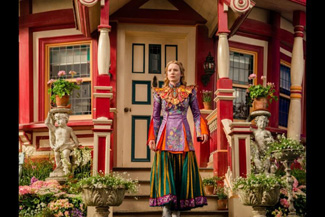Movie Review: Alice Through the Looking Glass
By Ben Gruchow
June 7, 2016
“Everyone lets go of everything eventually,” says Time to the titular character in Alice Through the Looking Glass, and Joe Roth would have been wise to internalize that line in the screenplay when deciding whether or not to greenlight a sequel to the least-beloved billion-dollar grosser on the books. But it does no good to assess the merits of an Alice in Wonderland follow-up in theory; it exists here and now, and must be dealt with. And it is a perfectly average thing, through and through: the most mechanical essence of a studio ethos that excels at mechanical profligacy.
I liked it better than the original, which was a grotesque fever dream in search of a story, and that's something; this entry takes the overwrought and unpleasant visuals and adds enough texture and symmetry to at least make the copious exercises in set design and CGI intriguing, and occasionally even a little beautiful. This does not distract us from - indeed, it more or less fixates us on - the fact that we are witnessing a demo reel instead of a story. There’s little pathos or catharsis to the character drama, and each scene mostly evaporates the moment it’s over.
The movie does well enough by its opening, which places Alice Kingsleigh (Mia Wasikowska, returning from her debut leading role) as a sailor on her late father’s merchant ship; upon returning to London from China, she realizes that what remains of her father’s estate has been sold off to her ex-fiance; her mother, it turns out, has brokered the deal. During much of these early developments, our attention keeps turning away from the principals and toward a strange blue butterfly that appears to be following Alice wherever she goes; she takes notice of it eventually and follows it through an enchanted mirror and into Underland (this franchise’s re-christening of Wonderland).
These early bits hold enough promise in both production design and story motif to entice us with the possibility of something like a Disney family-film equivalent to last fall’s Crimson Peak. Alice slips through the mirror, and we are re-introduced to Absolem, perhaps better known as the Caterpillar. Alan Rickman voices the character, like last time; this was his final performance, and it’s simultaneously appropriate and deflating; the actor’s voice was so distinctive and commanding that the one scene with Absolem is very nearly the single best in the film (the disparate sense of scale involved here, rendered with atmospheric absurdity, helps); we must set this against the reality that Rickman’s effectiveness as an actor was just as attributable to minute shifts in facial expression, to the volumes conveyed through a casual flick of the eyes, and we don’t get to see any of it here.
Once Alice actually gets to Underland, though, we’re confronted by the same schism that the first film had. None of the Underland characters are particularly likable or pleasant to look at; even the Hatter (Johnny Depp), ostensibly Alice’s closest friend here, seems perpetually on the verge of a kind of dangerous psychopathy. The Hatter occupies the central spot in this movie’s storyline; his family, long thought perished in a Jabberwocky attack, appears to be alive and missing instead; this has sent the Hatter into a deteriorating mental and physical state, and Alice must be the one to set off and determine where his family is, what happened to them, and how to get them back. Aiding her is the White Queen (Anne Hathaway); standing in her way are the Red Queen (Helena Bonham-Carter) and Time itself (Sacha Baren Cohen); a large part of the initial plan to track down the Hatter’s family involves stealing the Chronosphere, a spherical little device that warps into a giant time-traveling ball reminiscent of the similar device from any time-travel story you’ve ever seen visualized in any way. The theft of the Chronosphere bodes ill for Time, in all incarnations - without it, the giant clock that serves as the engine of time itself will run down and eventually stop.
Continued:
1
2




